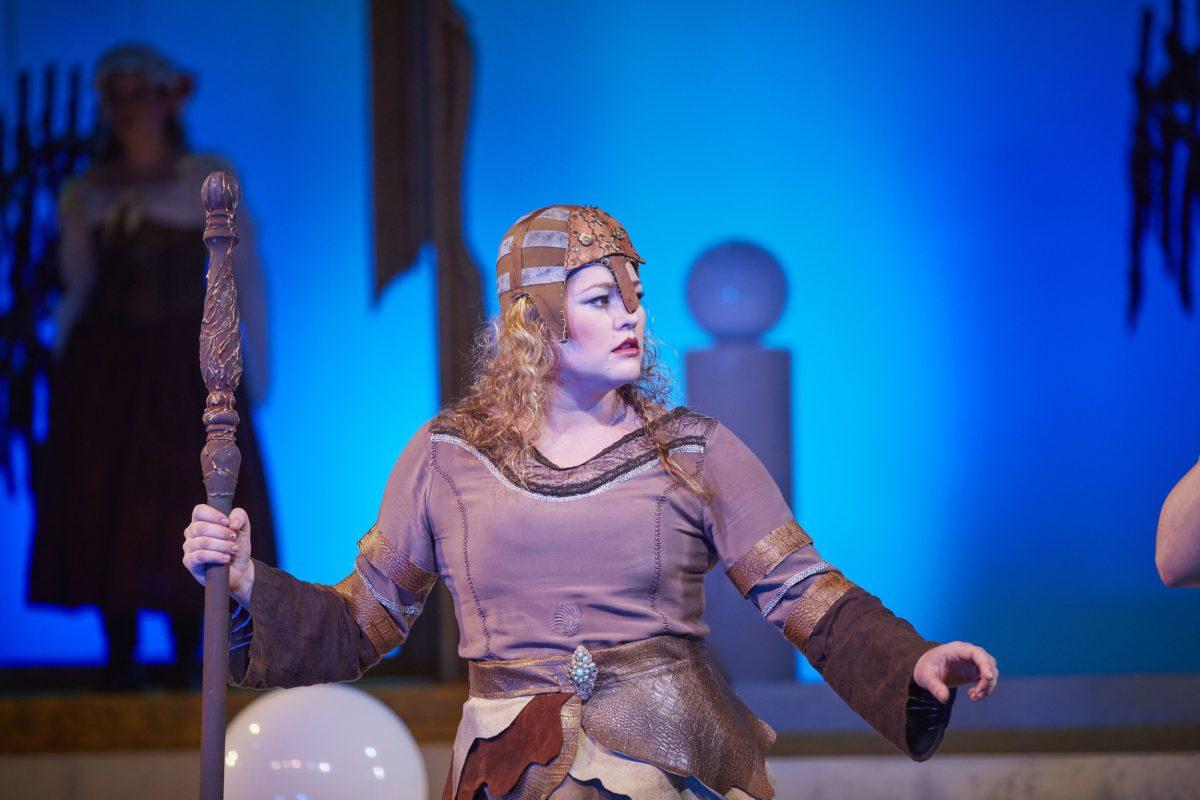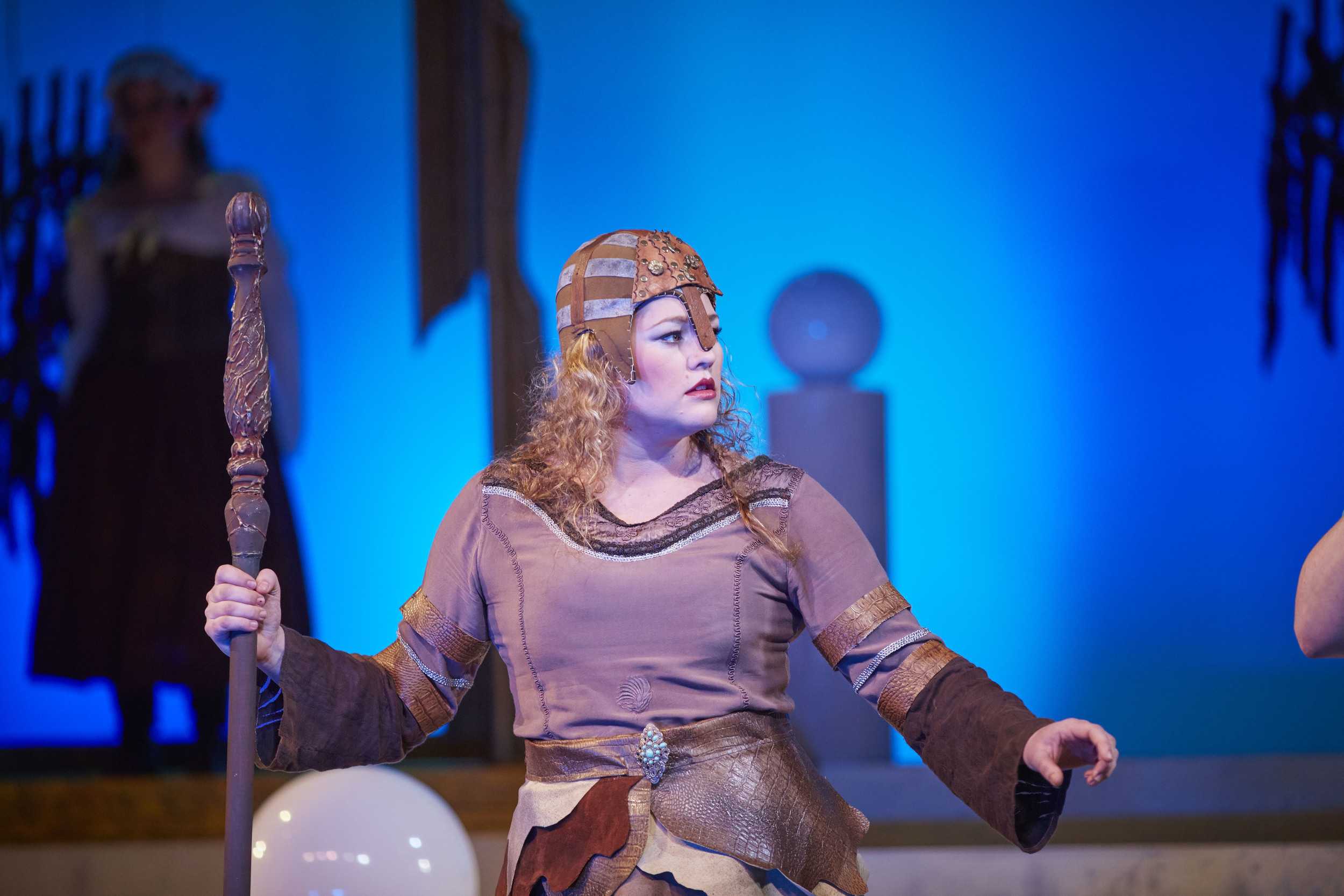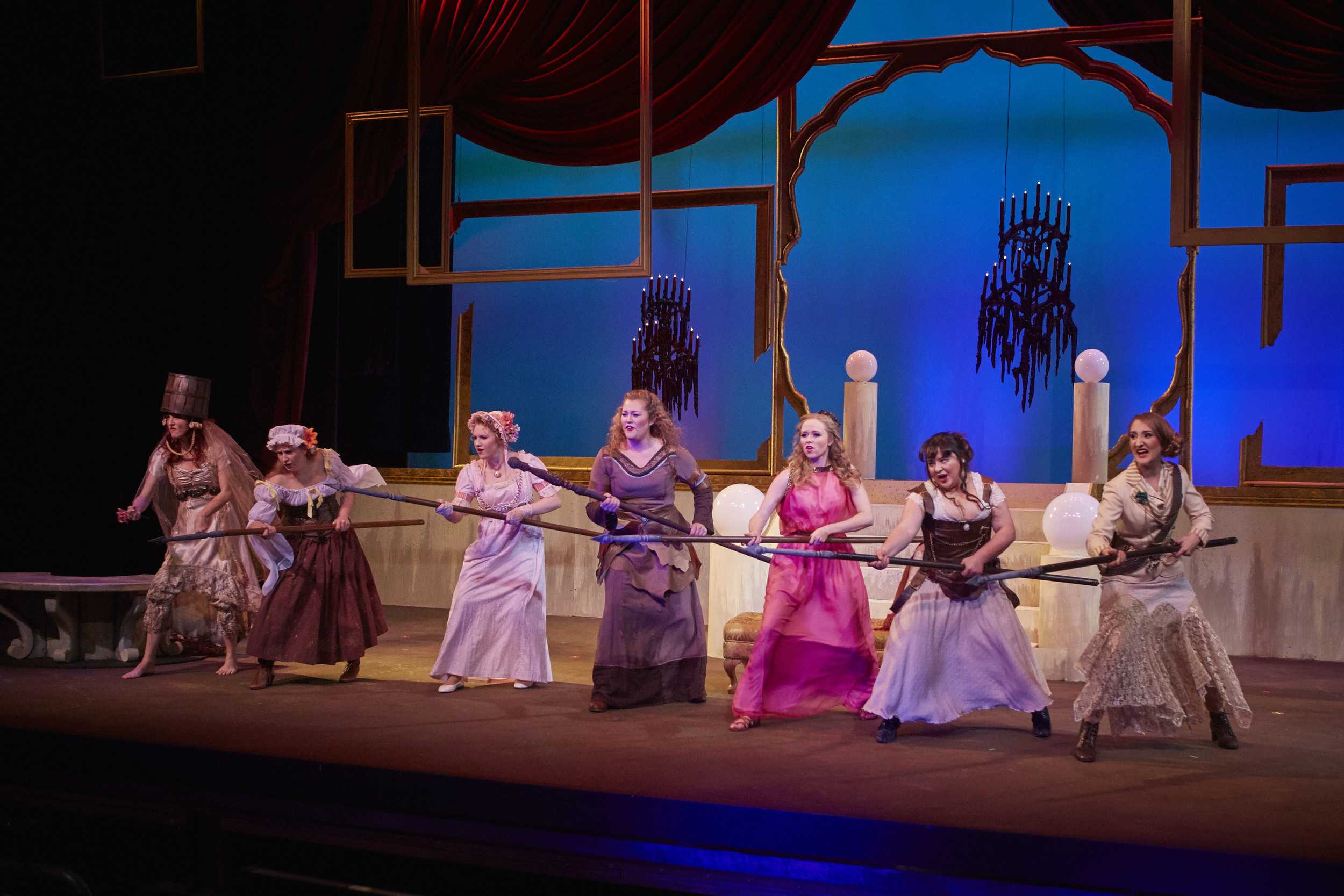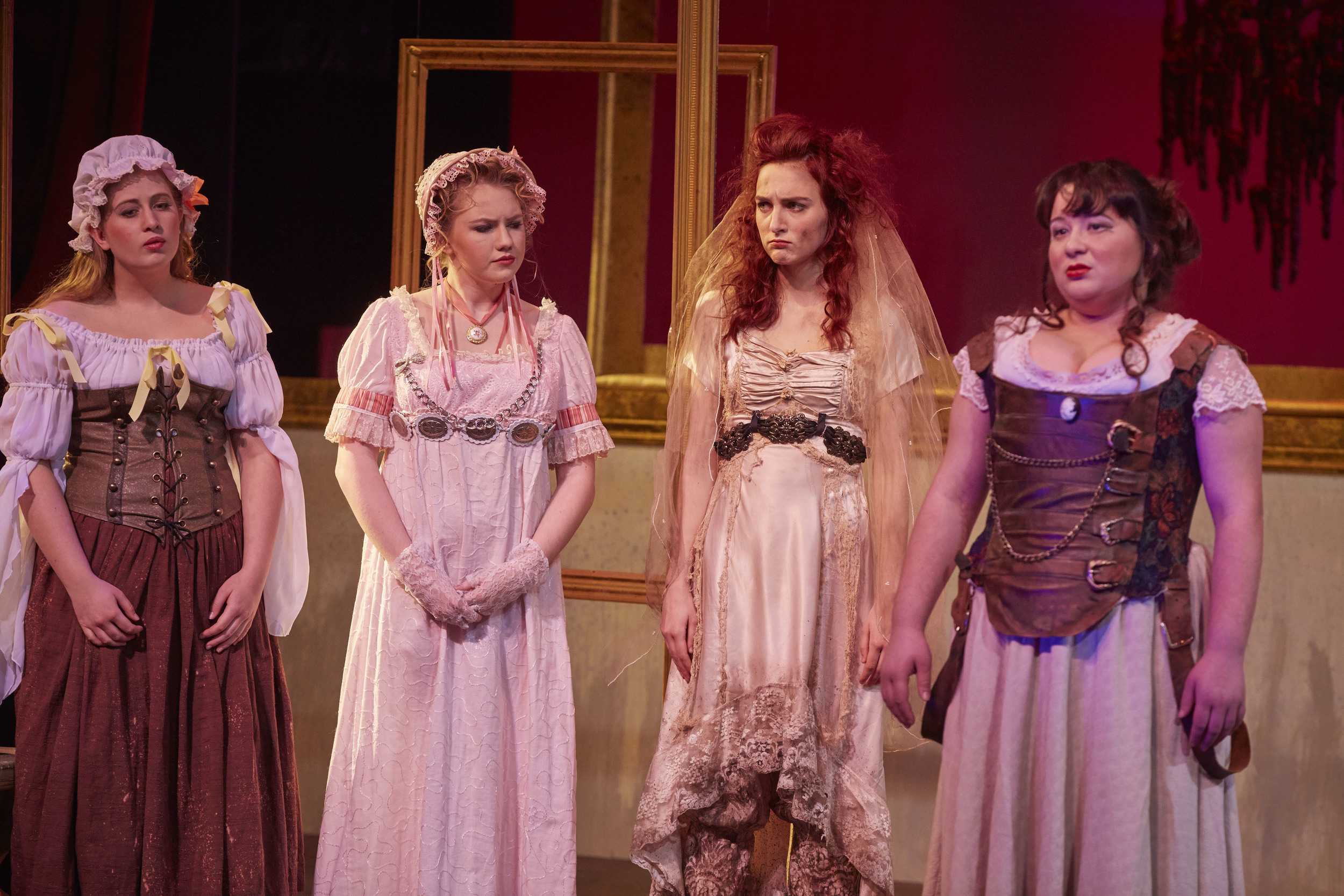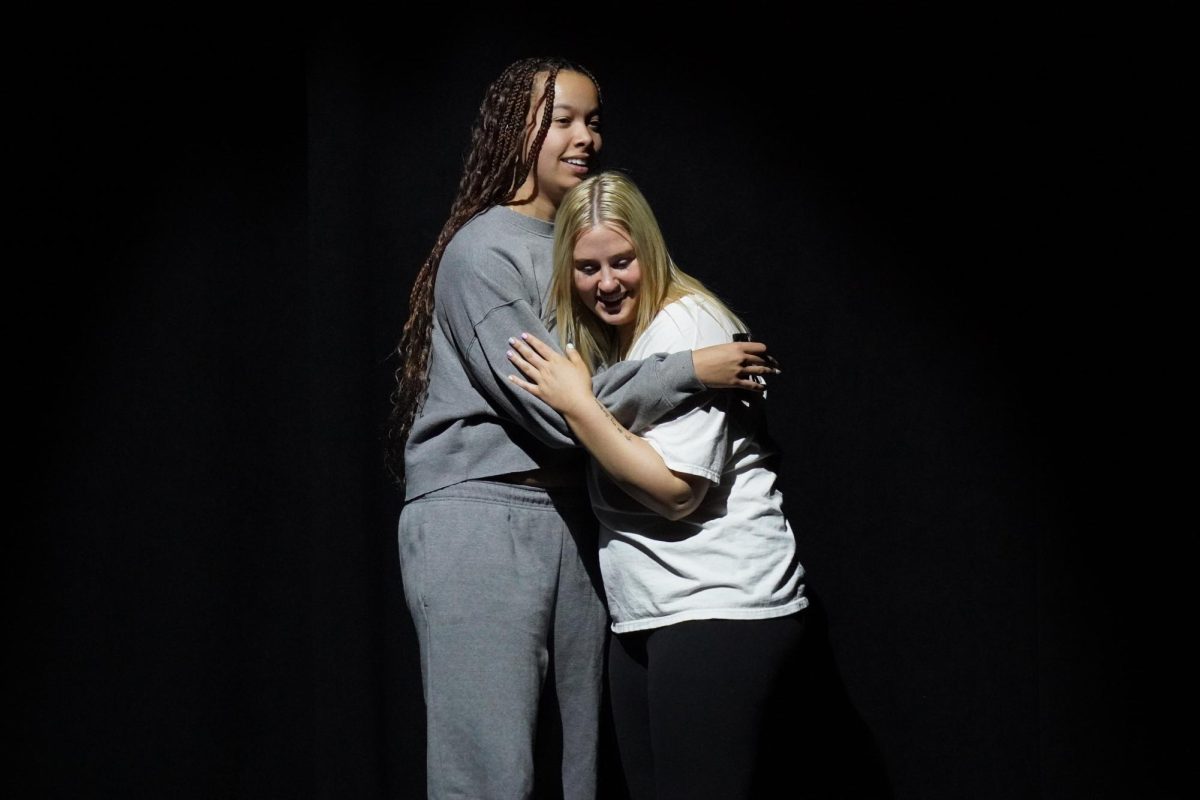Big strong women in Viking helmets belting songs no one can understand is probably the stereotype most people think of when they hear the opera.
Jane Erwin Hammett changed that with a new operetta that is not only entertaining and fun, but follows a story many people can relate to.
The operetta, “Heroines,” was written with in collaboration of well-known pieces from three different operas and shows, the struggles women faced throughout the 19th century while trying to gain control over their own lives.
The opening scene set up the plot perfectly setting the tone of the story. It started with an attractive male character surrounded by a group of fan girls that had been following him around.
The group of women in matching blue dresses exemplified women in that era and their idea that a man held the power and ability to control every aspect of their life. This was expressed strongly in the line all the women said together, “let us think of nothing at all.”
They spoke this in unison while the handsome man they were gawking over recited a poem. They portrayed this quote literally by posing in a zombie-like stance as he read, as if they were brainless.
Not only was this hilariously clever, but rather symbolic of the ridiculousness of these ideas women actually believed.
The protagonist, Jenny, played by Anna Leach said, “you men hold all the cards. You make the rules of the game.”
When Leach first entered the scene, it’s clear she would be a strong character in this story. Although she had an extremely rough past, she overcomes it by finding her strength throughout her journey.
“It is not until she (Jenny) is ripped from her life and thrust into interaction with women who face similar issues, that she begins to understand what needs to be done,” said Leach.
Scene by scene, Jenny shows up in different stories with various women whose lives were being controlled by someone else, whether it was a man, a family member or even a book.
Although very clever, at times the journey was difficult to follow. Comfortingly enough, the characters seemed just as confused as the audience, so the confusion appeared intentional. None of them knew why they were brought together, or how.
Things become a bit clearer when they enter the next scene with a joyful greeting from the spunky, blonde Eurydice, played by Allison Spencer, in the hot pink dress as she said, “Welcome to Hell.” From here, the women begin to find their spark and the inner power to stand up to the men.
The song “Death to the Invader” started out with the women’s chorus singing it to their leader, Melissa, played by Sarah Lousie Durham, preparing for battle.
The story really picked up when the scene ended with the main characters Eurydice, Jenny, Patience, Rose, Mad Margaret, Lucy and Ida picking up the spears and taking over the chorus of the song. At this point, it was clear they were ready to take control of their lives. Every one of these female characters were so unique, yet so important for each point of the story.
The audience’s clear favorite, however, had to have been Mad Margaret, played by Sarah Maxon. This character was dressed head to toe in dirt and a ratted wedding dress. Her madness is used very cleverly throughout the story to point out themes and reasoning.
In the scene welcoming the women to Hell, they are all stuck inside a frame, unable to move. Mad Margaret could move though, and would help each character out of her frame once she came to the realization of wanting control over her own life.
There is something about the crazy red hair and dirt smudges on her face that makes her so trustworthy, yet mad at the same time, and it’s only the hope of the audience that she overcomes the madness.
Something important to notice about the production is there were only two male characters in the entire cast. This allowed more focus on the female leads and their place in the story.
PJ Reinman, who plays both Mack the Knife, from Three Penny Opera and Count Danilo from Merry Widow had a significant role in the musical.
Mack, who submitted his wife to prostitution to make ends meet, was quite different from Count Danilo, who was in love with a widowed woman but was worried of seeming like a gold digger. As Reinman said, “Poor guy doesn’t know how to let his crush know he’s mad about her.”
It would have been easier to understand for the audience if each male character was played by a different actor, but either way, the men did play a key role in creating the image of the stories told by these women.
With an easy to follow lesson that also touches many individual lives with its relativeness, this operetta inspires people to stick up for themselves and take control of their own lives.
“This show is not about bashing men but rather about raising up women,” said Leach. “But more, it’s about empowering anyone who feels they don’t have a voice to speak up.”
Reinman had his own idea of what he wanted the audience to come away with after watching the show.
“One thing I hope everyone who sees the show can come away with is pizza rolls, not gender roles,” said Reinman. “Real Talk. It’s important to question social constructs.”
Some of the audience thought the musical lacked overall plot development.
This may have seemed true to some since there was no huge fight scene between the men and women, and there were no key arguments other than in the stories told by the women. However, the focus of this was the heroines, not the villains.
And by joining the women in the dance at the end of the last scene, it summed up the victory the female characters had overcome by showing men as their equal and not their ruler.





![[Both photos courtesy of sonoma.edu]
Ming-Ting "Mike" Lee stepped in as the new SSU president following Sakaki's resignation in July 2022](https://sonomastatestar.com/wp-content/uploads/2024/04/CC4520AB-22A7-41B2-9F6F-2A2D5F76A28C-1200x1200.jpeg)

























